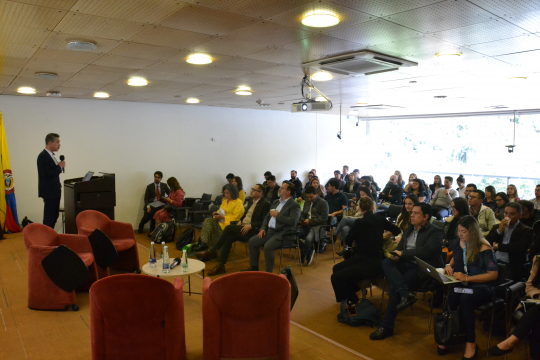EfD Colombia hosted an event called Progress towards air quality in urban areas. Stakeholders from the Secretaries of Environment, Health, and Mobility in Bogotá, Bucaramanga, Valle de Aburrá (Colombia), and Monterrey (Mexico), and representatives from the World Resources Institute (WRI) shared experiences and knowledge about management strategies of air quality in some Latin American cities.
Air quality in Bogotá has improved
Carolina Urrutia, Secretary of Environment, informed that fine particulate matter (PM2.5) has decreased in Bogotá in recent years. Partly, the pandemic contributed to this reduction; however, this decrease is also a result of complementary strategies, for example, the improvement of fuels for public transportation. The city implemented technical and normative decisions besides working with Ecopetrol (a national state firm for oil exploitation) to supply fuel with better quality for public transportation. Today, public transportation is not the main cause of bad air quality in Bogotá.
Bogotá still has big challenges to improve its air quality. The main challenges are resuspended particles caused by unpaved roads and pollution from heavy-duty vehicles. Currently, the southwest of the city has the worst air quality levels in the city and is the zone with low socioeconomic standards. The city is paving unpaved roads in such areas to reduce air pollution.
Stakeholders shared lessons and challenges
All stakeholders recognized the importance of coordination and interaction between the institutions responsible for administrating the environment, public health, and mobility to effectively improve air in cities. A critical challenge for the environmental secretaries is to provide timely data on the current air quality status to inform the political authorities. Institutions may either lack good tools and capacities to forecast poor air quality episodes or might have difficulties transferring clear information to the political authority to make decisions that reduce exposure to air pollution. Therefore, whether the air quality in a city is poor, it is urgent to implement emergency measures to protect citizens’ health.
Creating awareness among citizens about air quality conditions is also a key factor in air pollution control. Citizens may contribute to identifying pollution sources and report bad air quality conditions.
International agencies also play a role in improving air quality. They are continuously helping to make air pollution an important topic for international discussions. These institutions offer funds and finance public policy projects.
Policy for air quality implies several tasks
Jorge Bonilla, EfD Colombia Director and moderator of one of the discussion panels, commented that to improve air quality in cities four elements must be in place:
“The first element is institutional coordination. The second is transferring knowledge among cities and building strong capacities of public officers. The third element is that decisions must be supported by science (regional transport models, inventory of emissions, socioeconomic analysis, international evidence of health impacts, among others), and the last aspect is about convincing the political authority that air quality is important to improve population welfare”.
By: Manuela Fonseca
